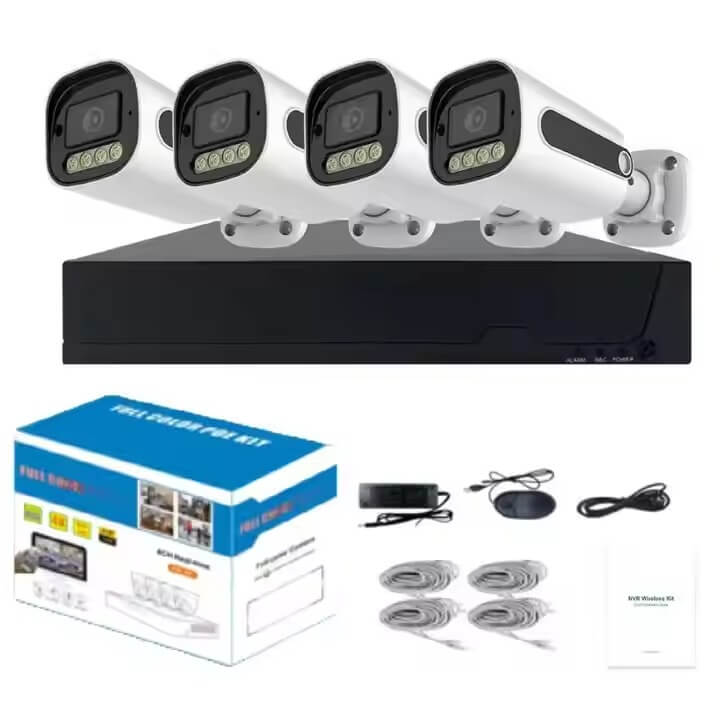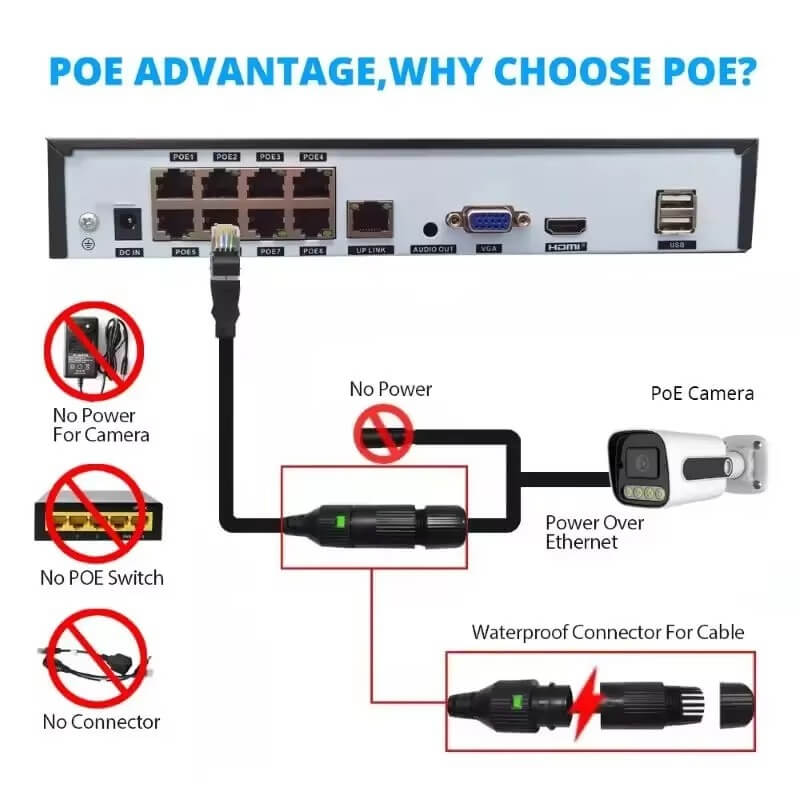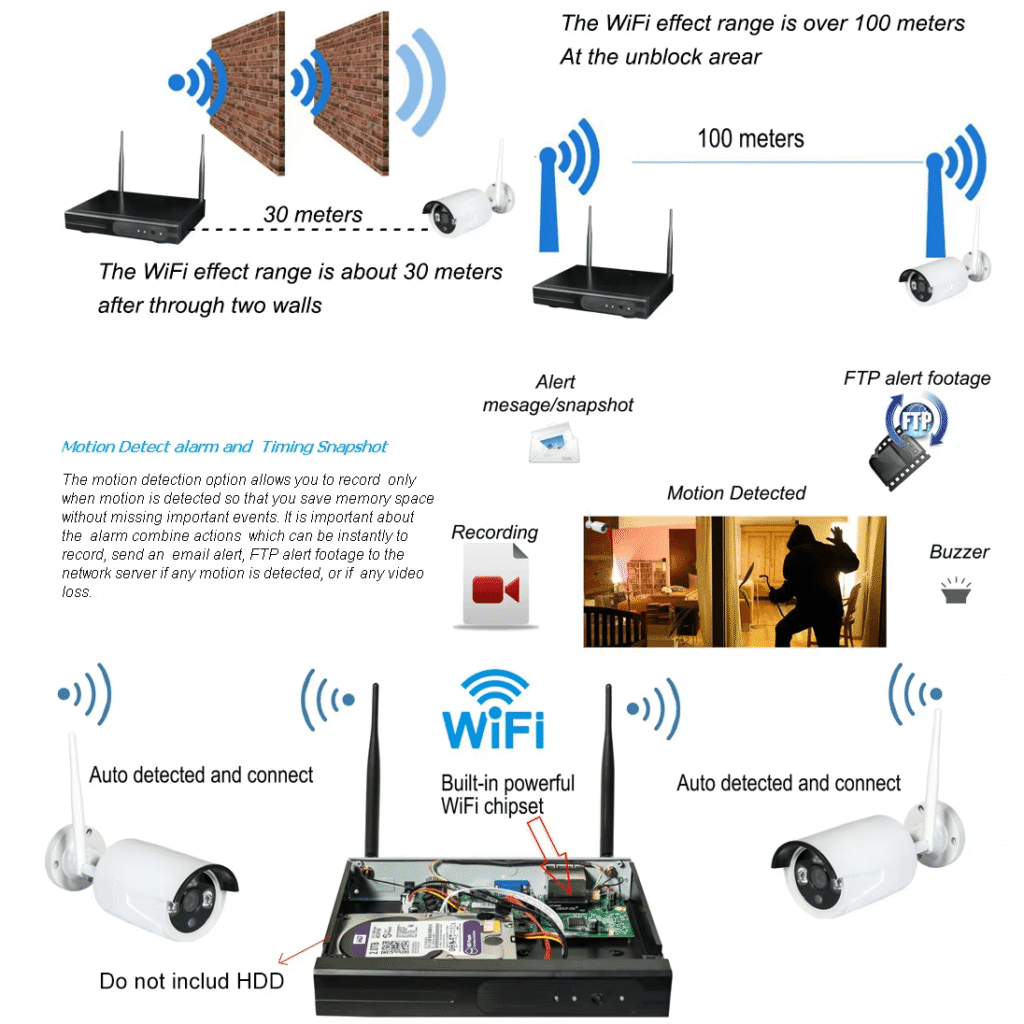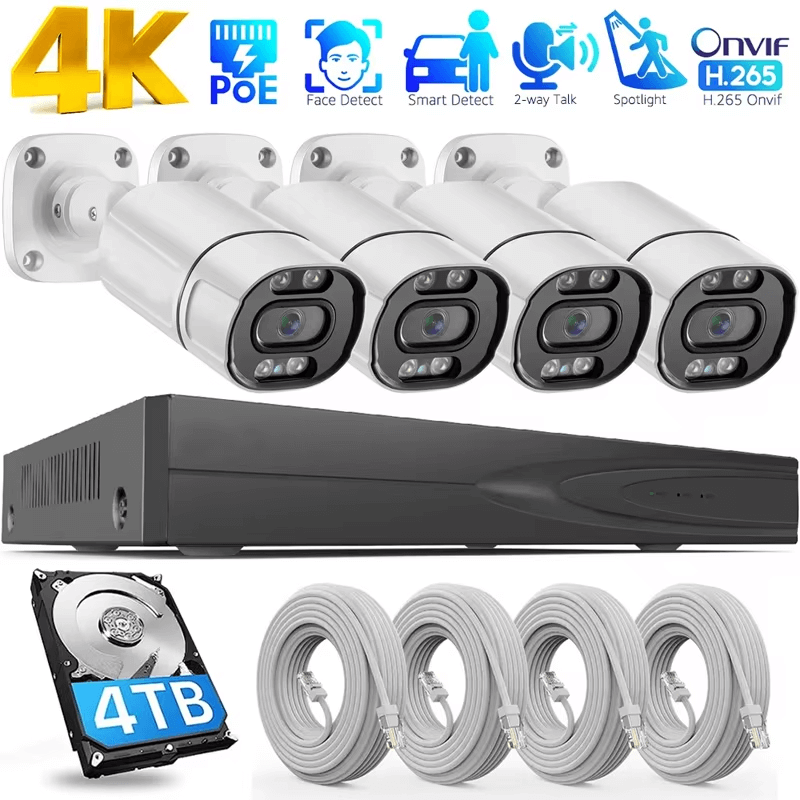Choosing between a Digital Video Recorder (DVR) and a Network Video Recorder (NVR) system is a crucial decision for business security. DVR systems work with traditional analog cameras, processing video at the recorder itself, while NVR systems operate with IP cameras, processing video at the camera level before transmission. Understanding these fundamental differences is essential for implementing the most effective surveillance solution for your specific business needs. The right choice depends on your existing infrastructure, budget constraints, quality requirements, and future scalability plans.
What Is A DVR Security System?
When choosing between DVR and NVR security systems, the decision ultimately comes down to your specific business needs, existing infrastructure, and future growth plans.
For businesses with legacy analog camera systems already in place, a DVR system offers a cost-effective solution that leverages existing investments. I’ve seen many small to medium retailers and offices benefit from the simplicity and reliability of DVR systems, particularly those with straightforward surveillance needs and limited budgets.
| System Type | Best For | Max Resolution | Installation Complexity |
|---|---|---|---|
| DVR | Existing analog infrastructure | Up to 4MP | Moderate (extensive cabling) |
| NVR | New installations, advanced needs | Up to 12MP (4K+) | Simpler (single PoE cable per camera) |
However, if you’re starting fresh or planning to scale your security system, NVR technology offers superior flexibility and future-proofing. The higher resolution capabilities make NVR systems ideal for businesses requiring detailed monitoring, such as banks, high-end retail, or large corporate campuses.
The installation environment also plays a crucial role in your decision. If your facility has limited access for running cables, the network-based approach of NVR systems might save you significant installation headaches and costs.
Still unsure which system fits your needs? Our team at JER-Tech can provide a personalized assessment of your security requirements. Feel free to contact us for a consultation tailored to your business environment.

What Is An NVR Security System?
Network Video Recorder (NVR) systems represent the modern approach to security surveillance, leveraging IP technology to deliver superior flexibility and performance. As someone who’s installed dozens of these systems, I can tell you they’re revolutionizing how businesses approach security monitoring.
The beauty of an NVR system lies in its network-based architecture. Each IP camera essentially functions as a mini-computer, processing and encoding video internally before sending it over your existing network infrastructure. This distributed processing approach yields remarkable benefits for growing businesses.
| NVR System Benefits | Business Impact |
|---|---|
| Single-cable PoE installation | 50-60% reduction in installation time |
| Remote access capabilities | Monitor from anywhere via smartphone/tablet |
| Scalable architecture | Easy addition of cameras as needs grow |
One aspect I particularly appreciate about NVR systems is their installation simplicity. With Power over Ethernet (PoE) technology, you’ll only need to run a single cable to each camera location—no separate power supplies or messy cable bundles cluttering your ceiling spaces.
The IP cameras in these systems offer crystal-clear 4K resolution capabilities that simply aren’t possible with traditional analog setups. This makes NVR systems particularly valuable for businesses requiring detailed identification capabilities, such as retail environments or access-controlled facilities.
At JER-Tech, we’ve helped countless businesses transition to NVR systems with minimal disruption. If you’re considering upgrading your existing surveillance setup, reach out to our team for a personalized assessment of how an NVR system might benefit your specific security needs.

What Are The Technical Differences Between DVR And NVR?
Diving into the technical differences between DVR and NVR systems reveals why each might be better suited for different business environments. After installing both types for countless clients, I’ve noticed these distinctions consistently impact performance and user satisfaction.
The most fundamental difference lies in where video processing occurs. In DVR systems, cameras simply capture raw footage, sending unprocessed signals to the central recorder for all the heavy lifting. NVR systems flip this approach entirely—each IP camera functions as an independent processing unit that handles compression and encoding before transmitting the ready-to-store data to the NVR.
| Technical Aspect | DVR Systems | NVR Systems |
|---|---|---|
| Signal Type | Analog | Digital (IP-based) |
| Cabling Requirements | Coaxial + Power | Single Ethernet (PoE) |
| Maximum Resolution | 4MP | 12MP+ (4K and beyond) |
| Storage Expandability | Limited | Extensive (NAS/SAN compatible) |
This architectural difference creates ripple effects throughout the entire system. At JER-Tech, we often recommend DVR systems for clients with simple monitoring needs and existing coaxial infrastructure, while NVR systems shine for those requiring advanced analytics or remote sites.
The storage capabilities also differ dramatically—DVR systems typically cap out with local hard drives, while NVR setups can connect to virtually unlimited network storage resources. This makes NVRs particularly valuable for businesses generating large amounts of footage or requiring extended retention periods.
Not sure which technical aspects matter most for your specific situation? Contact our technical team for a personalized assessment based on your facility’s layout and security requirements.

How Do Costs Compare Between DVR And NVR Systems?
Understanding the true cost comparison between DVR and NVR systems requires looking beyond the price tags on equipment. Having quoted hundreds of security systems for businesses of all sizes, I can tell you that focusing solely on upfront costs often leads to budget surprises down the road.
DVR systems typically offer a 20-30% savings on initial hardware purchases. A basic 8-channel DVR might cost $300-500, while comparable NVR systems often start at $500-700. Similarly, analog cameras for DVR systems generally run $50-150 each, while IP cameras for NVR setups typically range from $100-300+.
| Cost Factor | DVR System | NVR System |
|---|---|---|
| 8-Channel Recorder | $300-500 | $500-700 |
| Per Camera | $50-150 | $100-300+ |
| Installation (8 cameras) | $1,000-2,000 | $600-1,200 |
| 5-Year Maintenance | $800-1,200 | $400-800 |
The installation math is where things get interesting. At JER-Tech, we’ve found that NVR installations typically reduce labor costs by 40-50%. Those single PoE cable runs instead of separate power and video cables make a substantial difference in both materials and time.
The long-term cost equation favors NVR systems even more strongly. The easier upgradeability, reduced maintenance requirements, and superior scalability translate to lower total ownership costs. Plus, the ability to leverage existing network infrastructure can provide significant savings for businesses with modern IT environments.
Need a personalized cost analysis for your specific facility? Contact our team for a detailed quote comparing both technologies for your unique requirements.
How Do Installation And Scalability Compare?
The installation complexity and future scalability of your security system can make or break your surveillance investment. Having overseen hundreds of installations, I’ve seen businesses struggle with systems that seemed perfect on paper but became nightmares during implementation.
DVR systems follow a straightforward but labor-intensive installation approach. Each camera requires both a coaxial cable for video and a separate power cable—that’s two cable runs per device. In a 16-camera system, you’re looking at 32 separate cables threading through your facility. The upside? These systems operate independently from your company network, eliminating IT concerns about bandwidth consumption or security vulnerabilities.
| Installation Factor | DVR System | NVR System |
|---|---|---|
| Cables per camera | 2 (coax + power) | 1 (PoE Ethernet) |
| IT expertise required | Minimal | Moderate |
| Maximum cable distance | ~500 ft (coax) | ~328 ft (Cat6) |
| Expansion difficulty | High | Low |
NVR installations are remarkably more streamlined—a single Cat6 Ethernet cable handles both data transmission and power delivery through PoE technology. This 50% reduction in cabling translates to faster installations and cleaner aesthetics. At JER-Tech, we’ve completed NVR installations in half the time of comparable DVR projects.
The scalability difference becomes most apparent as your business grows. Adding cameras to a DVR system means physical port limitations and running new cable pairs. NVR systems enable you to add cameras anywhere network access is available—even in buildings across town — with proper configuration. Cloud integration options further enhance NVR scalability, a feature our team can explain in detail for your specific environment.

Which System Is Best For Different Business Types?
After years of designing security systems for organizations across various industries, I’ve found that business type is often the decisive factor in the DVR versus NVR decision.
For small businesses like local boutiques, single-location restaurants, or professional offices, DVR systems frequently provide the perfect balance of functionality and affordability. These businesses typically need basic surveillance with limited camera counts (4-8 cameras) and don’t require advanced analytics. The 40% cost savings offered by DVR systems can be significant for operations with tight budgets.
| Business Type | Recommended System | Primary Reason |
|---|---|---|
| Small Retail/Office (1-10 employees) | DVR | Cost-efficiency, basic coverage |
| Growing Mid-size (10-100 employees) | NVR | Scalability, remote access |
| Enterprise/Multi-location | NVR | Integration, analytics, central management |
| High-security Industries (banking, healthcare) | NVR | Resolution quality, compliance features |
Mid-sized businesses with growth trajectories consistently see better long-term value from NVR systems. Just last month, I worked with a retail chain that started with 3 locations but plans to expand to 12 over the next two years. Their NVR implementation allows them to add new locations to the same management interface without additional infrastructure at headquarters.
Industry-specific needs also matter tremendously. Manufacturers operating in dusty, high-vibration environments often appreciate DVR’s simplicity and durability, while our healthcare clients at JER-Tech universally require NVR systems for HIPAA-compliant monitoring with precise identification capabilities.
Not sure which category your business falls into? Reach out for a consultation tailored to your industry’s specific security requirements.
Conclusions
When choosing between DVR and NVR security systems, businesses must weigh immediate budget constraints against long-term needs and growth plans. DVR systems offer a cost-effective solution for smaller operations with basic security requirements or those with existing analog infrastructure. They provide reliable performance with simpler technical demands but limit future expandability and advanced features. NVR systems represent the future of video surveillance with superior resolution, flexible installation, advanced analytics, and seamless scalability. While they may require higher initial investment and more sophisticated network infrastructure, they typically deliver better long-term value and adaptability to evolving security challenges. Ultimately, the right choice depends on your specific business context, including facility size, security priorities, IT capabilities, and growth trajectory. Consulting with security professionals can help ensure your investment aligns with both current requirements and future business needs.


